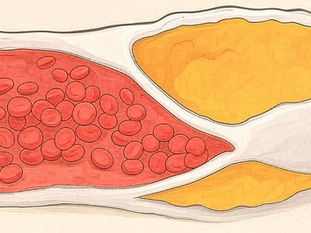
Myocarditis is one of those medical terms that can sound worrying if you’ve never come across it before. Patients often ask me whether it’s serious, whether it’s permanent, and how it’s treated. As a cardiologist, I believe it’s important that people understand what myocarditis is, what causes it, and when to seek medical help. So let’s break it down clearly.
Understanding the Basics
Myocarditis is an inflammation of the heart muscle, known medically as the myocardium. This inflammation can reduce the heart’s ability to pump blood effectively and can also disrupt the heart’s rhythm.
The cause of myocarditis is usually an infection, often viral. In some cases, it’s caused by bacteria, fungi, or autoimmune conditions. Occasionally, medications or reactions to toxins can also lead to it. In many cases, the exact cause isn't always found.
What Are the Symptoms of Myocarditis?
One of the reasons myocarditis can be difficult to spot is because the symptoms vary widely. Some people may feel completely fine, while others experience more noticeable problems. Common symptoms include:
Chest pain or tightness
Shortness of breath, especially during physical activity or when lying down
Fatigue
Fainting or dizziness
Swelling in the legs or ankles (in more serious cases)
Mild flu-like symptoms if caused by a virus
Some people only find out they’ve had myocarditis after undergoing tests for other conditions.
Is It Serious?
The short answer is it can be, but not always. In mild cases, myocarditis may resolve on its own with rest and monitoring. In others, it can lead to more significant complications, including:
Heart failure (where the heart becomes weaker)
Dilated cardiomyopathy (a condition where the heart becomes enlarged and cannot pump effectively)
Arrhythmias (abnormal heart rhythms that can sometimes be life-threatening)
Sudden cardiac arrest, though this is rare
This is why it's so important to seek advice early if you're experiencing any concerning symptoms, especially after a recent illness.
What Causes Myocarditis?
In the UK, the most common causes of myocarditis include:
Viral infections, such as coxsackievirus, adenovirus, parvovirus B19, or even the flu
COVID-19, which has been linked to a small number of myocarditis cases, particularly in younger men
Autoimmune diseases, such as lupus or sarcoidosis
Medications, including certain chemotherapy drugs or antibiotics
Excessive alcohol or recreational drug use, in rare cases
Sometimes, myocarditis can follow a simple cold or chest infection — which is why it can catch people off guard.
How Is It Diagnosed?
If I suspect a patient may have myocarditis, I’ll usually start with a few basic tests:
ECG (Electrocardiogram) – to look for irregular heart rhythms
Blood tests – to check for signs of heart muscle damage or infection
Echocardiogram – an ultrasound scan of the heart to assess how well it’s pumping
Cardiac MRI – this is one of the best tools we have to look for inflammation in the heart muscle
Occasionally, a biopsy of heart tissue may be considered, but this is rare
Getting the right diagnosis early helps guide treatment and monitor recovery.
What Does Treatment Involve?
In most mild cases, treatment for myocarditis focuses on rest and avoiding strenuous physical activity for several weeks or months. You might also be prescribed:
Anti-inflammatory medication to reduce swelling
Heart failure medications, such as ACE inhibitors or beta-blockers, if the heart is struggling
Antiviral treatment, though this depends on the cause (and is not commonly required)
Treatment for arrhythmias, such as medication or, in some cases, a pacemaker
The key point I stress with my patients is that rest really matters during recovery. Pushing yourself too soon, especially with exercise, can increase the risk of complications.
How Long Does Recovery Take?
Recovery from myocarditis varies depending on the severity. Most people with mild inflammation recover fully within a few weeks to a few months. In more severe cases, it might take longer, and some people may develop lasting effects on heart function.
This is why follow-up care is so important. I usually arrange repeated echocardiograms and ECGs over several months to make sure everything is improving.
Can It Come Back?
In most cases, myocarditis doesn’t return once it resolves — especially if it was triggered by a viral infection. However, if it was caused by an autoimmune condition or ongoing exposure to something like alcohol or medication, there may be a risk of recurrence.
If you're concerned about repeat episodes, your cardiologist can help monitor your heart regularly and adjust your lifestyle or medication plan as needed.
Is Myocarditis More Common in Certain People?
Myocarditis can affect anyone, including young, healthy adults. In fact, it's one of the leading causes of sudden cardiac death in young athletes, though this remains rare.
You're more at risk if you:
Have had a recent viral illness
Have an autoimmune condition
Use certain drugs or alcohol excessively
Have a family history of heart muscle disease
I always encourage people to get checked if they’re experiencing symptoms like chest pain, palpitations, or shortness of breath — especially if they follow a viral infection.
Can You Prevent It?
You can’t always prevent myocarditis, but there are ways to reduce your risk:
Get vaccinated – this includes flu and COVID-19 vaccinations
Avoid exercising when ill with a virus
Seek medical help for chest pain or unusual fatigue after being unwell
Manage your immune system – if you have an autoimmune condition, staying on top of treatment helps reduce inflammation risks
There’s no guaranteed way to avoid myocarditis entirely, but looking after your general heart health certainly helps.
Myocarditis on the NHS vs Private Clinics
In the UK, myocarditis can be diagnosed and managed both on the NHS and through private cardiology clinics. Through the NHS, tests like ECGs and echocardiograms are usually arranged quickly once the condition is suspected. However, waiting times can vary depending on location and urgency.
At Heartsure, private appointments mean you can be seen within days, and we can often carry out ECGs and scans during the same visit. For those needing urgent reassurance or more flexibility, private care offers a faster route to answers and personalised support.
My Summary
Myocarditis may sound intimidating, but in many cases, it’s treatable — especially when identified early. I’ve looked after patients who’ve made a full recovery within months with the right rest and medical support.
If you’ve had a viral illness recently and are now experiencing symptoms like chest discomfort, breathlessness, or an irregular heartbeat, it’s worth discussing these with your GP or a cardiologist. You know your body best — and when something doesn’t feel right, it’s always worth checking.
Understanding your heart means taking symptoms seriously and making informed choices. Whether you’re experiencing symptoms or just want peace of mind, we’re here to help.






